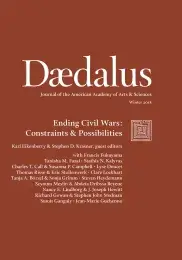The International Regime for Treating Civil War, 1988–2017
The post–Cold War international order has promoted a “standard treatment” for civil wars involving the use of mediation to end conflicts and the deployment of peacekeeping forces to implement the resulting settlements. The United Nations has played a leading role in applying this standard treatment, which enjoys broad international support. By contrast, Western efforts to promote more robust humanitarian intervention as a standard response to civil wars remains controversial. While effective in relatively permissive postconflict environments, international mediation and peacekeeping efforts have proved insufficient to resolve harder cases of civil war, such as those in South Sudan and Syria. The UN has struggled to make the standard treatment work where governments refuse to cooperate or low-level violence is endemic. Growing major-power tensions could now undermine the post–Cold War regime for the treatment of civil wars, which, for all its faults, has made a significant contribution to international order.
The current international order is highly interventionist in civil wars. But this does not make the current order unique. What differentiates it from past orders is that these interventions are motivated by a belief that political agreement is a more appropriate end to civil wars than military victory. Since the late 1980s, civil wars have become a laboratory for experimentation in war termination, conflict resolution, and protection of noncombatants. Major powers, multilateral institutions, and, above all, the United Nations have acted on the assumption that civil wars are amenable to political, social, and military engineering, resulting in an international order that resolutely rejects giving war a chance.
These interventions fall into two distinct, though sometimes combined, treatments. The first is mediation and the use of peacekeepers to implement peace agreements. This approach has become so frequent and pervasive that it is uncontroversial in national capitals and in intergovernmental forums. The second is the use of military force to protect civilians caught in war. This more radical form of intervention remains controversial and no consensus has emerged over when, where, and how it should be applied, or whether it should be applied at all.
The ascendancy of mediation as a frequent, almost automatic international response to civil wars over the last thirty years, as well as the development of institutions and technical capacity in peacemaking and peace-building, suggests that a new international regime for treating civil wars took hold in the 1990s.1 The rise in mediation in intrastate conflicts led to a further expectation: if parties reached a political agreement to end their war, then they could expect the deployment of peacekeepers to assist and oversee the implementation of the agreement. These two norms–mediation as an expected and preferred international response to civil war and the use of peacekeepers to implement any agreement reached through mediation–form what we call the standard treatment for civil war.
While this regime for treating civil wars emerged and developed, more robust humanitarian intervention in civil conflicts also became frequent. But since there has been little consensus among governments over the appropriateness or utility of that approach, it has been unpredictable and deeply unsettling for international relations. Over the last decade, the infusion of humanitarian goals, especially the protection of civilians, into peacekeeping has eroded overall government commitment to and support for mediation and peacekeeping as the standard treatment of civil wars.
. . .
